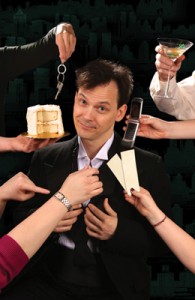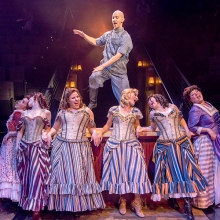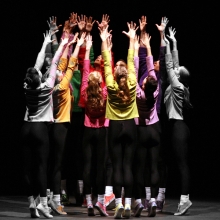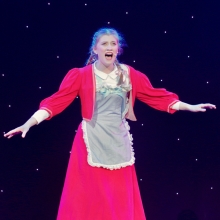Filichia Features: In Comes Company
Filichia Features: In Comes Company
Precisely 506 months to the day after I saw the very first performance of the pre-Broadway tryout of Company at the Shubert Theatre in Boston, I saw it again -- at the GeVa Theatre Center in Rochester.
I was sure that this audience wouldn’t react the way it did on that night in March, 1970. Certainly it wouldn’t react the way Bostonian first-nighters did when Dean Jones, playing semi-confirmed bachelor Bobby, sang “Happily Ever After.”
This may sound hard to swallow, but I truly believe that I saw the precise moment when Jones said to himself, “I’ve got to get out of this show.” Indeed, he did, soon after the Broadway opening. Larry Kert replaced and got the Tony nomination that would have otherwise gone to Jones.
Jones’ decision, I believe, happened as he delivered his 11 o’clock number -- not “Being Alive,” but its predecessor. Bobby was telling the older, Boston Brahmin-filled audience that marriage meant living “happily ever after in hell” – something that even the most dissatisfied marrieds did not want to hear. The silence in the house seemed to make Jones’ eyes widen to twice their usual size.
Thirty-two years later, I was asked to moderate a press conference for the Alabama Stage and Screen Hall of Fame, into which Jones was being inducted. Before I could bring up Company , he did. “I went out there in Boston,” he said, “and after I sang ‘Happily Ever After,’ I could feel them asking me, ‘Why do you hate us?’ I saw their eyes widen, and realized that they hated me.’” And I told Jones that his eyes widened, too.
Many eyes widened at Company back then – and some minds did, too. For better or worse, George Furth’s script and Stephen Sondheim’s songs opened the doors for a lot of previously hidden feelings.
Now in 2012, Bobby is still 35, but Company itself has turned 42. Some shows date horribly in four-plus decades. GeVa’s production showed that Company is still relevant and that a 21st century audience has an easier time with it than those Nixon-era Bostonians.
(With one exception. More on that later.)
COMPANY at Geva Theatre
"There's a time to come to New York and a time to leave," Bobby’s girlfriend Kathy says. And Company, after coming to Manhattan in April, 1970 and leaving there on New Year’s Day in 1972, has been produced all of the country and the world. I've even seen children perform it at the Centenary Young Performers Workshop in Hackettstown, New Jersey, where Michael Blevins has even had his tweens and teens do Sweet Charity, Pal Joey, A Chorus Line and The Act.
Director Mark Cuddy, who’s also GeVa’s artistic director, certainly thinks that Company hasn’t dated at all. The program shows that he specifically set it in "Present Day.”
That choice did, of course, lead to some anachronisms. The show does give love to '70s ways, from smoking in a nightclub to “a copy of Life.” We don’t say “broads” for women anymore, thank heaven. Telephone service has changed so that a busy signal is now a rarity, and few if any still say that "my service will explain." A long time has passed, too, since a bartender was asked to make a Sazerac Sling.
And yet, one scene has dated in an utterly charming way. April, one of Bobby’s girlfriends, originally thought that she was being quirky if not scandalous by having a male roommate. In those days, the idea of unmarried members of each sex sharing the same living space had not shown itself to be the benign situation we now know it to be.
But several things mentioned in the original Company are certainly still with us. People still have problems with alcohol as well as issues with weight. Bobby’s friend Sarah wasn’t the first and won’t be the last person on earth to adore chocolate, hot sour dough bread, chili, manicotti and Sara Lee.
Today’s wives and husbands still matchmake – albeit in distinctly different ways. Wives want Bobby to have a lifetime mate (in the song "Poor Baby") while husbands offer him the chance to have one-night stands ("Have I Got a Girl for You"). Even in 2012, plenty of people believe that (to paraphrase a later Sondheim song) no one should be alone.
Like it or not, however, Furth and Sondheim’s observations about marriage haven’t dated a whit – and will thus interest a contemporary audience. Wedlock (with an emphasis on the latter syllable) isn’t the easiest of living situations because "you have another person there all the time." Three husbands sing that they’re “Sorry/Grateful” for their marriages, and while no wife does, we see in other scenes that they feel the same way. By now, these characters’ children have since reached the same conclusion.
You may have heard sports announcers remark as they observe an on-field altercation, "These two teams don't like each other." Well, in many of Company's cases, these two spouses don't like each other. They're certainly working out their hostilities.
Frankly, any cast you choose will be able to replicate such feelings – ether because of what they’ve witnessed through their parents, relatives, neighbors or themselves. Michele Ragusa’s Sarah squinted in delight every time she corrected her husband Harry (Bruce Sabath), as if he’d enjoy her being right as much as she did. Sabath stressed how his "money was being wasted” on her karate lessons, somehow making a laundry list of accusations with one word.
Anne Allgood was a superb Joanne. When she tackled “The Ladies Who Lunch,” she said “Everybody laugh” in such a way that did make most everybody laugh. But the way she delivered the rest of the song was masterful, and showed a different interpretation: Allgood’s Joanne suggested a life full of regret.
There's been lots of talk over the years of what a cipher Bobby is, and how he’s asked to do little but react to those around him. Cuddy was wise to cast Jim Poulous. The actor suggested that, like Christopher Isherwood and Cliff Bradshaw before him, he was a camera – and that he could be likable.
Poulous reiterated that Bobby is a single woman’s dream. He asked women about themselves, which has always been a sign of good manners and a healthy curiosity about people. This Bobby also seemed to be searching for the right thing to say. And when he parted company with Kathy, he gave her ultimate sexless sign of affection: the kiss on the forehead.
Those who do Company might not share Cuddy’s decision on how to stage “Being Alive.” He put Poulous on the floor and seemingly had him en route to a fetal position. However, do consider what lighting designer Joel Moritz did at number’s end: he put a white-hot white light on Bobby, as if to expose him.
Cuddy’s cast seemed to suggest that they knew what conversations they'd have after Bobby went home. As a result, directors might consider giving their casts this acting exercise: improvise on what you think you characters would say and do to your spouses after Bobby vamoosed.

The director also gave a nice surprise between Act One, Scene Three and Act One, Scene Four. During the scene change, the audience could see, despite the darkness, that a four-foot inflatable castle was being hauled onto the stage. What?!?!
Ah, but Cuddy had had a bright idea for David and Jenny, the couple to whom Bobby brings marijuana: make them parents. So along with the castle was an enormous stuffed frog that also served as a child's chair. The implication that the pair had children reiterated what Jenny later said about their drug abuse: “Bobby, we’re just too old.”
Cuddy also used a smart convention with Amy, the young woman who has second, third and ninth thoughts about “Getting Married Today.” Furth’s stage direction simply says “Amy is shining a pair of men’s black shoes,” but Cuddy, like some directors before him, put her in her white wedding dress. Thus, the second we saw her we knew that she had misgivings about tying the knot; after all, brides-to-be take much more care with their beloved wedding dresses. (Better still: costume designer Pamela Scofield gave Amy a particularly perfunctory dress to underline her malaise a la mariage.)
Company also gives directors a chance to cast their favorite performers who don't dance or even move particularly well. Remember, the original cast famously had people with two left feet -- but choreographer Michael Bennett made it seem as if they had two right feet. (Does a kick line still get applause? It certainly did here in Rochester.)
Now to that change that may lessen your audience’s enjoyment. Company has been rewritten to address the question that had often been asked since opening night: has a 35-year-old man never married because he’s secretly gay? In 1970, no one dared speak of such a possibility. If Jones had trouble with “Happily Ever After” in Boston, imagine how he would have freaked out if Furth had then given him this scene. Bostonians might have rushed out of the theater as if a sci-fi monster had just tromped onto the stage.
Frankly, from the nervous silence in the GeVa crowd, a few audience members’ fuses were blown here, too. Perhaps they were thinking, “Those crazy downstaters!” That even included Poulous’ Bobby, who ran off the stage.
Still, Company is well worth doing. Note, too, that it doesn't require a big set. A couple of pieces of furniture on a bare stage usually swings it. What you do need, however is a Bobby unlike Dean Jones – meaning someone who won’t bail on you. Now that Company is a classic and has even become audience-friendly, he’ll be easier to find.

You may e-mail Peter at pfilichia@aol.com. Check out his weekly column each Tuesday at www.masterworksbroadway.com and each Friday at www.kritzerland.com as well as his reviews for the Newark Star-Ledger on www.nj.com. His newest book, Broadway Musical MVPs, 1960-2010: The Most Valuable Players of the Past 50 Seasons, is now available through Applause Books and at www.amazon.com.
Share
Callboard
-
Shake and shimmy it with the #Hairspray20Challenge! Join MTI and Broadway Media in celebrating 20 years of #Hairspray. Duet this here or find us on TikTok! Special thanks to @broadwaymedia and @jammyprod. Choreography Guides are a licensor official resource that provides step-by-step instruction from Broadway and professional choreographers for your productions! Visit @broadwaymedia to learn more. #mtishows #youcantstopthebeat #hairspraymusical #goodmorningbaltimore
View on Instagram




























